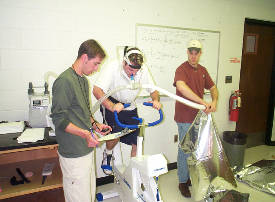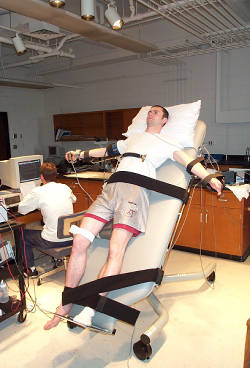
Subjects
We studied 9 healthy, sedentary males volunteers (22.4 +/- 1.1 years, 177.7 +/- 8.34 cm, 86.7 +/- 16.4 kg, 16.11 +/- 8.3 % body fat). Subjects were non-smokers and none participated in regular aerobic activity.
Measurements
A.VO2max testing
We measured each subject?s heart rate, volume of inspired air (VI), fractions of expired and inspired carbon dioxide (FECO2 and FICO2) and oxygen (FEO2 and FIO2), and the ambient temperature and pressure.
B.Autonomic function testing
Data were sampled at 500 Hz and stored to computer using the Windaq Acquisition (Version 2.15) software package for later analysis via WinCPRS (Version 1.131). We continuously recorded subjects? ECGs, beat-by-beat arterial pressures (SAP and DAP), respiratory rates, and muscle sympathetic nerve activity (MSNA) via microneurography*.
* Efferent sympathetic traffic was recorded from the peroneal nerve muscle fasicles at the popliteal fossa


(60° head-up tilt)
| UROP | Students | Employment | PAB | BMES | Links | Contact Us |
| Michigan Tech Homepage |
Last modified 13 November 2000
Mail comments and/or questions concerning this site to the Webmaster
Mail questions concerning Biomedical Engineering at Michigan Tech to biomed@mtu.edu